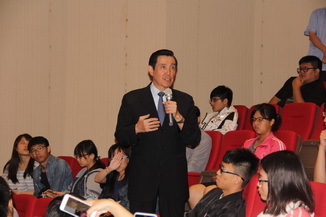| |
 |
News |
 |
Browsing: 4056
times

|
Date:2017-06-05
Bracket:2017 NCYU News
Department:ncyu
|
 NCYU Ma Ying-Jeou Talks on Cross-Strait Diplomatic Strategies at History Symposium
NCYU Ma Ying-Jeou Talks on Cross-Strait Diplomatic Strategies at History Symposium
The “8th Symposium on Regional History, Geography and Applied History 2017” was held by the Department of Applied History, National Chiayi University, from June 2nd to 3rd on the Minghsiung campus. Former President Ma Ying-Jeou was specially invited to share his experience as a national leader in his speech entitled “Our National Strategies on the Cross-Strait, National Defense and Diplomatic Issues.” He offered unique and brilliant insights, and enthusiastically interacted with the audience, who erupted in laughter with his humorous remarks. A miscellany of questions was raised by the students, and the speech lasted one hour longer than scheduled.
Former President Ma mentioned that in his eight-year tenure as Taipei mayor, he had met challenging crises of a severe typhoon, earthquake and virus (SARS). During the SARS period, for example, he had stayed at office for as long as 42 days without going home. When the crisis had finally resolved, he called his wife Christine Mei-ching and said, “I’m going home,” and was met with a surprising reply, “Why go home!” It suddenly reminded him of how the historical figure Huo Qubing had once felt, “The Xiongnu are not yet eliminated, why should I start a family?” Huo had to cast his family aside to pursue his patriotic ambitions. Former President Ma said with a smile, “With this kind of wife, there is no enemy to be feared,” which brought the audience to laughter.
Former President Ma traced the events from the cross-Strait conflicts in 1949 to the Ma-Xi meeting, and also shared his thoughts on the hot issue of late that Taiwan was denied entry to the World Health Assembly (WHA). From 1997 to 2008, said Former President Ma, we had tried every means to go back to WHA, but all the 12 proposals had been denied at the WHA meetings due to limited numbers of supporting votes. It was not until 2008 when the conflicting terms across the Strait were resolved thanks to the return to the 1992 consensus did Taiwan successfully returned to WHA in 2009 with the lowest costs and most satisfying results. Therefore, Former President Ma maintained that the cross-Strait diplomatic relations should be built on the premises of good communication, mutual confidence and buffering in a gradual, slow but sure course. Any hastening act would only lead to frustrating results.
On the issue of military power, Former President Ma proposed the strategy of building a “small yet strong, small yet solid, small yet clever” military force. In other words, we should solidify our military strength, find our own advantages and put them to display at the right times, and surpass our rivals with intelligence instead of force. In his eight years’ presidential terms, Former President Ma highly valued the military strength and combat power, and the monthly salary for recruit soldiers had thus been increased from NT$7,000~8,000 to NT$33,000. As to our country’s stance in the international society, Former President Ma indicated that we should play five roles as a peace maker, humanitarian assistance provider, cultural exchange facilitator, creator of new technologies and business opportunities, as well as a pioneer in Chinese culture. He suggested that the internal diplomatic strategies include solidifying our military strength and the economy. The external methods, on the other hand, should involve coming to peaceful terms with the mainland China, friendly terms with Japan, and close terms with the United States. International relations should be built in ways that are low-profile, zero-accident, moderate, and realistic. We should also distinguish right from wrong, see things through other people’s eyes, put ourselves in others’ shoes, and have good intention toward others. Finally, we ought to collaborate with people who treat us the same way in all our diplomatic endeavors.
Towards the end of his speech, Ma Ying-Jeou was met with a wide spectrum of questions from the students. One of the mainland Chinese students asked how he regarded the strong “Taiwanese consciousness” held by the young Taiwanese. After asking the student in which province he was born, Former President Ma answered that each of the many provinces in the mainland China has its own provincial consciousness. It was thus not a rare case for Taiwanese to have their own consciousness since people around the world all have their own consciousness for their homelands. The Taiwanese consciousness has been put to examination only because some of its people had come from different mainland provinces. It is reasonable for Taiwanese to preserve their own qualities and languages, so there is no need to consider it with such severity.
The event organizer said the symposium covered keynote speeches on three subjects ranging from cultural assets and tourism, Hakka ethnic groups and culture, and regional history and geography. A total of 16 papers were delivered during the two-day event, and renowned scholars from around the country were invited to share their ideas. The two-day symposium aimed to explore the kaleidoscopic “regional” studies from the perspectives of applied history and regional history.
Zhang Zhengtian, associate professor of the Fujian and Taiwan Hakka Research Institute, Longyan University in the mainland China was invited to deliver a speech on the Hakka ethnic groups and cultures. There is a diversity of Hakka cultures due to different historical and geographical circumstances. To enhance their depth and width, Hakka cultures should develop on the basis of glocalization. The Hakka in the Chianan region should work together to draw attention and feedbacks to their ethnic and cultural issues.
|
 |

|
 |
|
 |
 |
|


 ][
][